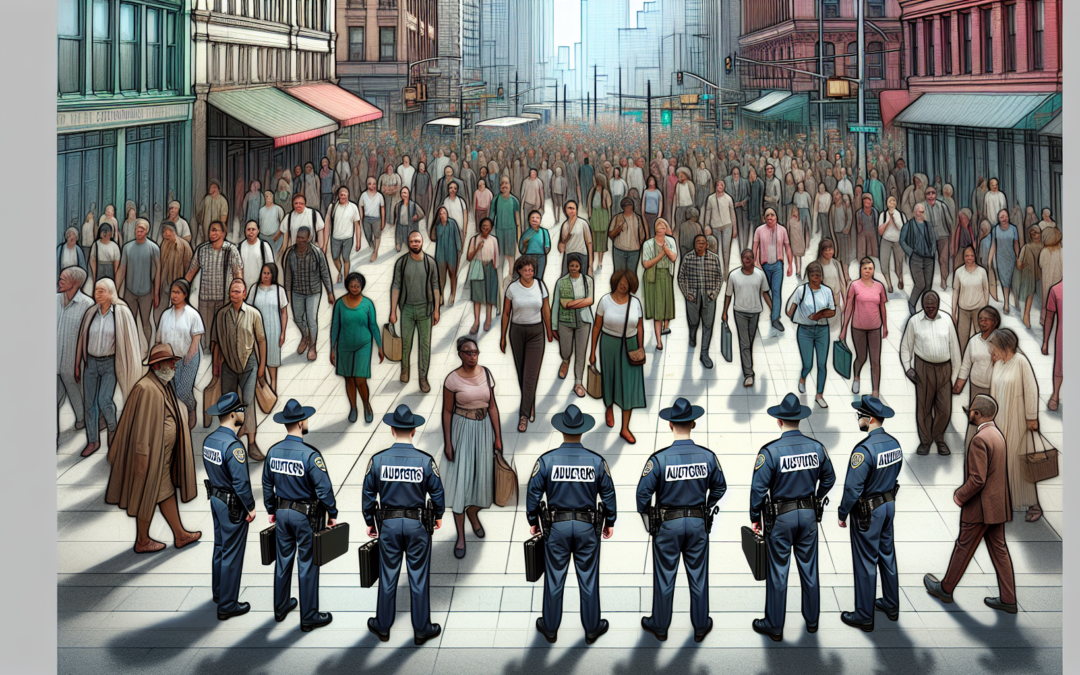Power-Thirsty Auditors: A Burden on Law Enforcement
America prides itself on the First Amendment—a bastion of free speech, peaceful assembly, and the right to petition the government. Enter First Amendment auditors, a rising, controversial breed of citizens who brandish smartphones and video cameras as weapons, targeting public servants with relentless questioning and intrusive filming. Though they claim to promote transparency, their antics often muddy the waters of genuine accountability.
The Rise of First Amendment Auditors
First Amendment auditors position themselves as journalists and activists, wandering through public spaces with the self-appointed mission of documenting interactions with government employees, especially law enforcement officers. They show up unannounced at police stations, government buildings, and public spaces, recording everything and everyone in sight. The resulting footage is then uploaded to various social media platforms, often deliberately crafted to paint officers in a negative light, long before the entire context is understood.
Unprecedented Pressure and Harassment
For the men and women in uniform, who already face incredible pressure in their line of duty, these encounters feel less like accountability and more like harassment. Officers are frequently depicted as adversaries, baited into confrontations that are recorded for viral fodder. Imagine spending a shift navigating a high-stress, life-and-death environment, only to be skewered by a stranger determined to create drama for clicks and views.
A Distraction from Real Policing
The presence of these auditors introduces an unwelcome complication to routine law enforcement duties. When auditors engage officers, it isn’t merely a conversation. It’s a spectacle that disrupts normal operations, redirects critical resources, and distracts from genuine emergencies. Every encounter with an auditor means more paperwork, internal reviews, and potential disciplinary measures—none of which contributes productively to an officer’s core responsibilities.
Consider this exhaustively staged charade, where auditors wander into precincts and demand specific types of interaction, all while their cameras are on standby to catch any perceived misstep. For officers, these faux-journalists’ provocations do nothing but fragment their attention and curtail their ability to respond effectively to genuine problems.
Law and Ethics in Limbo
Even if First Amendment auditors have the right to film in public spaces, ethical gray areas persist. Indeed, they stretch these freedoms to the breaking point, using their cameras not as tools for genuine accountability, but as weapons of entrapment. These so-called “auditors” immediately upload isolated clips, leading to public frenzy and uniformed backlash directed squarely at law enforcement.
Despite the ever-growing scrutiny on police conduct, it’s essential to respect the societal role that law enforcement agencies fulfill. Officers are subjects of unjust edits that build backlash swiftly, particularly when faced with an online world hungry for snapshot judgments. The portrayal easily spirals out of control, leading to personal threats and community mistrust—all created by footage lacking comprehensive context.
The Emotional Toll on Officers
Auditing impacts are not solely professional—they are deeply personal. To serve and protect is both a duty and a tremendous commitment, often translated into additional stress carried beyond the precinct’s threshold. The unchecked actions of auditors exacerbate this emotional tax, suggest disloyalty, and sow seeds of public mistrust within the very communities officers dedicate themselves to protect.
The damaging portrayal by auditors does not only degrade officers but their families as well. Imagine being hectored online based on an out-of-context snippet, reflecting negatively not just upon one’s career but eroding familial pride and respect. The psychological toll is unmistakable and interlaces with professions desperately in need of our support.
Standing Together: The Role of Law-abiding Citizens
To counter the growing influence of self-appointed auditors, it demands support visible and vocal from the law-abiding citizens—who stand to lose when law enforcement focuses must shift dramatically to handle these auditors. Public safety cannot be responsibly managed under media-influenced duress. Collectively, taxpayers and principled citizens should demand evaluative spaces where auditing actions are cast into firm judicial, regulatory review.
Engagement in dialogues emphasizing collective societal priorities over views skewed via dramatic entrapment is essential. We pray for candid conversations about the indispensable but oft-maligned role law enforcement undertakes daily. Initiatives must transcend from mere digital shame spheres into actionable and appreciable policies promoting genuine officer accountability without theatrics.
A Unified Stand
First Amendment auditors wielding their cameras in masquerades of accountability do a grave disservice to the very fabric of law enforcement integrity. Sifting through footage for clashes may fill channels online, yet it drains vital police resources, devours morale, and fosters a culture pervasively antagonistic towards those sworn to serve us. It is time we focus energies intently on collaboration, truthful oversight attuned with aiding municipalities, and crafting stable environments encouraging lawful auditing.
Supporters of our men and women in blue, take action:
– Subscribe to ongoing updates: Gain deeper insight into these contentious encounters and educate via John Ligato’s YouTube channel.
– **Inform_:_ A broader social audience on lawful, comprehensive examination by engaging shared perspectives lorded throughout relevant forums namely the John Ligato Show FB page.
In conclusion, law enforcement’s battle with First Amendment auditors spotlights an unsettling trend destined for collective affront if unchecked. Rallying earnest support and engaging transparent discussions stands paramount in preserving law’s due respect while fostering authentic transparency.

Recent Comments